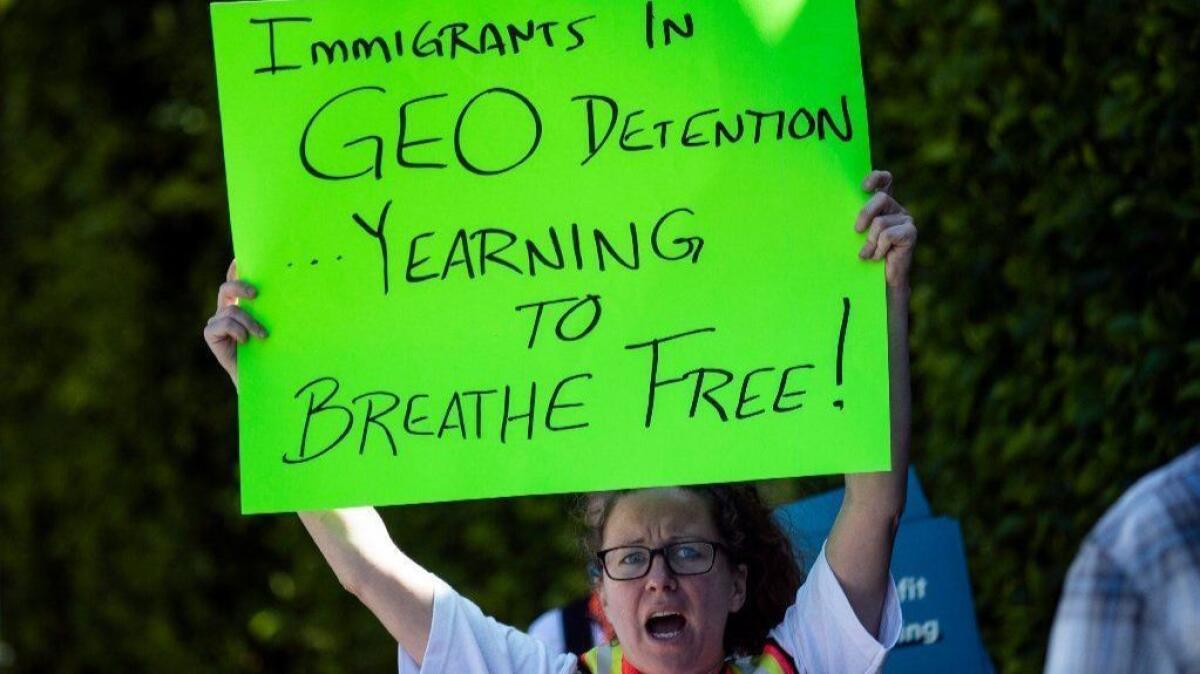Democratic candidates vow to ban private prisons and detention centers

- Share via
Democratic presidential candidates, seizing on anger over the mistreatment of immigrants at privately run detention centers, are pushing to outlaw them — and private prisons altogether, moving the issue to prominence in the 2020 primary race.
The demand for a ban on private lockups is becoming an increasingly potent campaign issue, as the private prison industry flourishes under a Trump administration eager to provide it with inmates and lucrative federal contracts. As the population housed in private lockups grows, a steady stream of government investigations and media reports has documented abuses and called into question whether they are saving taxpayers any money.
On Friday, Sen. Elizabeth Warren of Massachusetts rolled out a detailed critique of the facilities as well as her blueprint for getting rid of them. She joined other candidates who are vowing to phase out all private immigrant detention centers and prisons operated for the federal government, including Sens. Kamala Harris of California and Bernie Sanders of Vermont.
“The companies running prisons and detention centers regularly sacrifice safety to boost their bottom line,” Warren wrote in a Medium post published Friday morning.
“Washington hands billions over to corporations profiting off of inhumane detention and incarceration policies while ignoring the families that are destroyed in the process. We need to call that out for what it is: corruption.”
The focus on the facilities comes as yet another federal report this month detailed squalid conditions and civil rights concerns at three privately run immigrant detention centers. Among them is the facility at Adelanto, in San Bernardino County, where an investigation last year revealed significant health and safety risks, including nooses in detainee cells. The report this month found “improper and overly restrictive segregation, and inadequate detainee medical care.”
A state audit this year also found extensive problems at immigrant detention facilities in California.
Warren and the other senators are calling for an outright ban on the private facilities, which currently hold tens of thousands of detainees. Nearly three- quarters of all detained immigrants are held in private detention centers, accounting for a population of approximately 36,000. Warren noted the number of immigrant children detained has quintupled over the last year.
There are more than twice as many immigrants held in detention centers than there were in 2000, a year when Border Patrol agents were apprehending substantially more undocumented immigrants than they are now.
Private prisons, meanwhile, hold about 12% of federal inmates, or 18,100 people. In addition to closing those prisons, Warren would effectively ban scores of private prisons in state systems by denying federal public safety funds to states that use them. Some 128,000 inmates were housed in state private prisons in 2016.
The push to phase out private prisons and detention centers is popular with many liberal Democrats, but also may appeal to swing voters. Criminal justice reform has become an increasingly bipartisan issue, with Republicans playing a leading role in pushing policies that emphasize rehabilitation and shorter sentences for nonviolent offenders.
President Trump, who signed a criminal justice reform bill last year, has sought to use former Vice President Joe Biden’s support for tough sentencing guidelines during the Clinton-era as a wedge issue against him.
But many prison reform advocates call the president’s own policies draconian, especially the administration’s reversal of an Obama-era plan to move all federal inmates back into publicly operated facilities.
Stocks of private prison firms dropped precipitously in 2016 when the Obama Justice Department unveiled its plan to end the use of private lockups.
In 2017, the plan was scrapped by the Trump administration. The administration’s criminal justice policies have since been a boon for the industry, particularly Trump’s crackdown on immigrants.
A report by Bloomberg Government this year noted that government spending has surged on two companies that have faced multiple allegations of mistreatment of migrants, CoreCivic Inc. and GEO Group Inc. Each has seen the amount they receive in government contracts swell by tens of millions of dollars.
Detentions in private facilities are no bargain for taxpayers, according to federal data compiled by the advocacy group Freedom for Immigrants. It costs less than $100 per day to house an undocumented immigrant in a municipal facility. The cost of housing them in a private detention center averages more than $140 per day.
Many localities are not renewing their contracts with the Trump administration to house immigrants in municipal jails — a protest of its policies. Inmates are often transferred to remote privately run facilities like the one in Adelanto.
“Let’s be clear: private prisons are making money off the incarceration and suffering of human beings,” Harris wrote in a tweet Wednesday. “One of my first acts of business as president will be to begin phasing out detention centers and private prisons.”
Sanders vowed last month to “end the dehumanization of undocumented people” with a series of steps that included a ban on private detention centers. “We absolutely must end the existence of the private for-profit prison industry,” he wrote in a Medium post.
More to Read
Sign up for Essential California
The most important California stories and recommendations in your inbox every morning.
You may occasionally receive promotional content from the Los Angeles Times.











